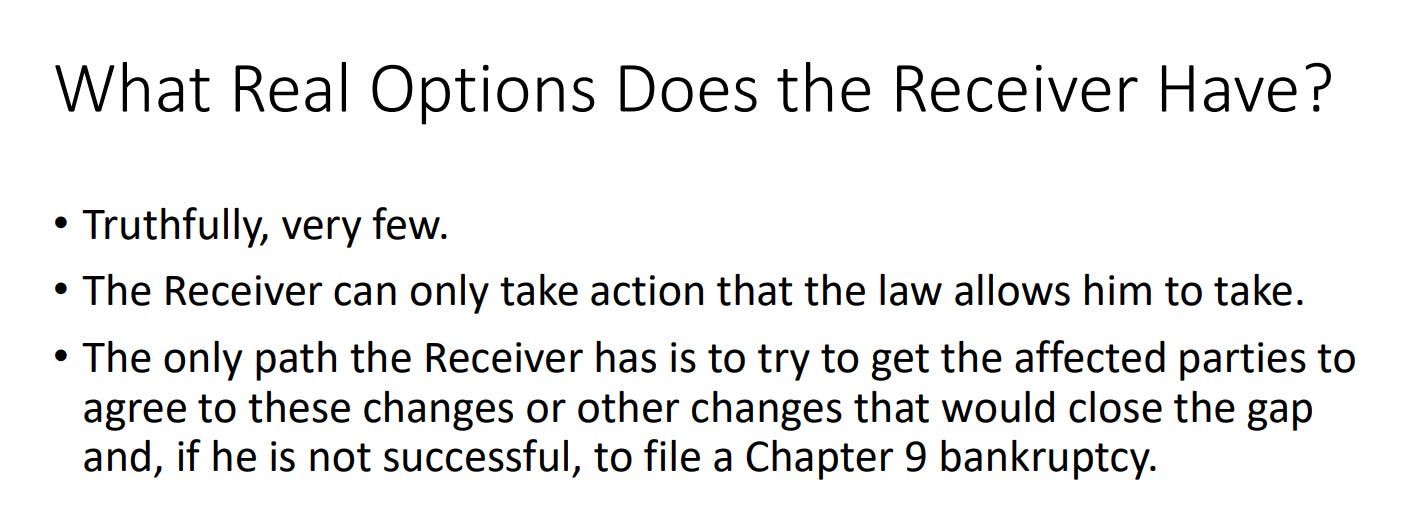Lesson from Chester PA: Don't Count Assets You Don't Actually Have, Public Pension Plans
It's not a clever move to pretend to have more money than you do in public finance
Before I start — this is the first time I have ever seen anything like this, and I’ve been writing about iffy public pension practice for years.
This goes above and beyond.
Chester, Pennsylvania is bankrupt
The reason it’s coming up right now is Chester, Pennsylvania is bankrupt:
Chester, Pennsylvania, files Chapter 9 bankruptcy petition
Chester, Pennsylvania, has filed for Chapter 9 bankruptcy. The petition was filed Thursday in the United States Bankruptcy Court for the Eastern District of Pennsylvania.
In its Chapter 9 filing, the city’s receiver listed estimated liabilities of between $100 million and $500 million with assets of between $10 million and $50 million. The city has about $15 million of bonds still outstanding, according to reports and has an unfunded pension liability of more than $100 million.
Among the city’s listed creditors are U.S. Bank N.A, as paying agent for $9.149 million of trustee 2017A bonds and $6.107 million of trustee 2017B bonds.
Judge Ashely M. Chanwill conduct the Chapter 9 case in the Bankruptcy Court for the Eastern District of Pennsylvania. It has been assigned case number 22-13032.
“Since my appointment over two-and-a-half years ago, I have worked to avoid this day. However, Chester has a severe structural deficit that cannot be addressed by one-time fixes, has unaffordable retiree benefit liabilities, and cannot reliably provide vital and necessary services to its residents,” Michael Doweary, the state-appointed receiver for the city, said in a statement emailed to The Bond Buyer.
I highlighted the important bit, as there is something somebody sent me that was simply appalling.
There are many things appalling about the pension situation of Chester, and if you think the pension of Detroit retirees getting cut in Detroit’s bankruptcy proceedings was bad, I have some nasty news, because some very bad things are going to happen in this workout.
For one, Chester doesn’t have an art museum with some great artworks it can hold hostage, unlike Detroit.
It’s a town of only 33,000 people. It doesn’t have much in the way of resources.
A “half-funded” pension… that was really completely unfunded
Now, I haven’t dug out all the numbers, because, unsurprisingly, the financials for such a small place in such distress are not exactly in the detail one likes to see for in-depth analysis. I am merely copy/pasting from a presentation from a year-and-a-half ago.
Here it is, with screenshots.
Before declaring Chapter 9 bankruptcy last week, Chester was in receivership, and at the receivership site, there are a variety of links.
This presentation dated May 25, 2021 is key.
Here is the nutshell:
Since 2013, Chester has not been able to make full contributions to its pension plans
However, the unpaid portion had been booked as an asset to the funds in determining the funded ratio for the pension funds — last measured at 49%
But if you removed the portion that was the receivables, the funded ratio was 3%
THAT’S A BIG DIFFERENCE
I will clip it from the slides:
Slide number 2:
Every year, the actuary calculates how much the City legally needs to contribute to the plans which is called the Minimum Municipal Obligation or “MMO”
Slide number 3:
Due to the number of retirees and its relative financial weakness, the police pension plan comprises approximately $8.5 million or 85% of the City’s 2021 MMO.
The City has not been able to afford making its full MMO payment since 2013. As a result, the City is incurring penalties and interest costs on these missed payments and its police pension plan is dangerously close to running out of money to pay benefits.
Slide numbered 6:
Slide numbered 7:
Basically, the police plan is pay-as-you go.
As I said, I’ve never seen a public pension plan take credit for contributions that were never actually made. Yes, they were “required” contributions…. but they never made them, and they were never going to make them, were they?
By pretending those contributions were actually made, and using those amounts not actually made to give funded ratios to be higher than they actually were, retirees and employees were given a false impression of pension fund health.
Not that the funded ratios were that great, frankly.
The games stop at some point
There has been a more recent presentation: Chester’s Financial Situation, Options for Recovery, and Bankruptcy – September 13, 2022
Beginning of the presentation:
And the end:
There is a Facebook page for the receivership, and, I’m sorry to say, the commenters are a little in denial about what is achievable with the resources of Chester.
It sounds like the people may get (some) of their pensions, but get the retiree healthcare cut. Maybe.
But let me get back to my original point.
This had been limping along for over 27 years. This town had been getting deeper into a hole, and this “clever trick” of booking the unpaid contributions as an asset for the pension… which not only affected the official funding ratio, but also affected the required contributions….which all of a sudden got bigger because they noticed that hey, they didn’t actually have those assets.
So.
Maybe that clever trick wasn’t quite so clever.
The most it did was stave off the inevitable for a few years, and it may have made things worse when the inevitable did arrive.
If, instead of booking cash they didn’t have, they had to start telling people that maybe they couldn’t promise so much in retiree health care and pensions, deals could have been made 10 years earlier.
They may have made promises they could have kept.
I wonder who thought it was a good idea.






